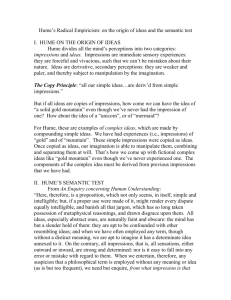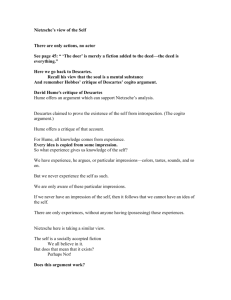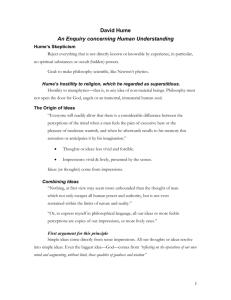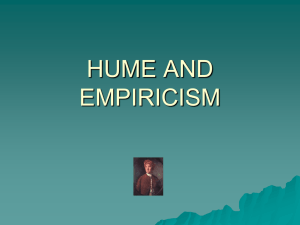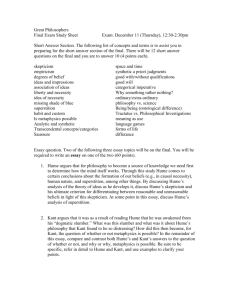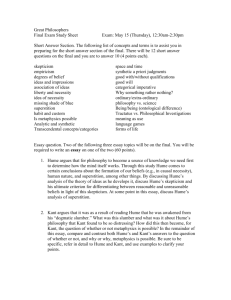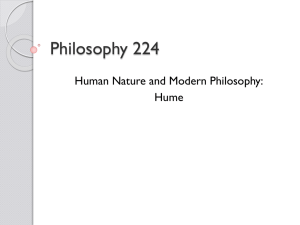Philosophy 224
advertisement
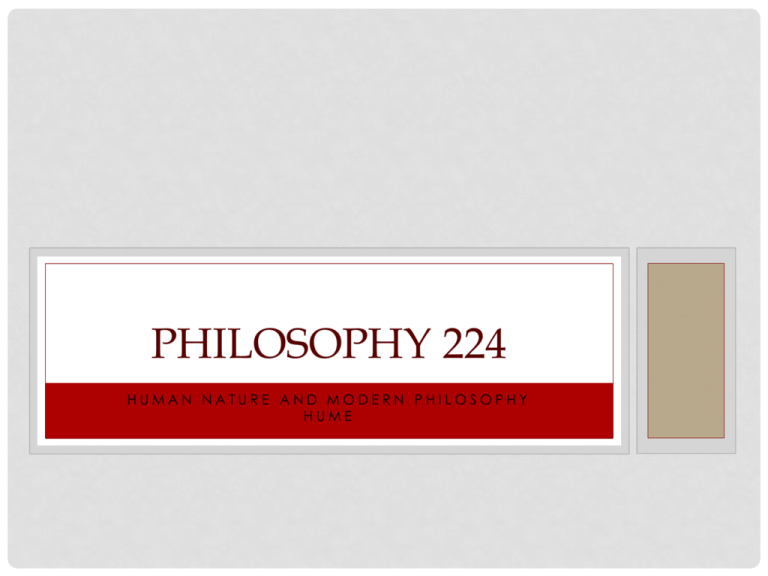
PHILOSOPHY 224 HUMAN NATURE AND MODERN PHILOSOPHY HUME HUME’S TREATISE • Hume (1711-1776) is arguably the most important philosopher to write in English. • Like his fellow moderns, Hume did not confine himself to philosophy but wrote influentially on a wide range of topics. • The Treatise was the most important of the philosophical works that he produced. It’s aim is to address the question of human nature with the aim of producing a “compleat system of the sciences” (100). A COMPLEAT SYSTEM • Why does Hume believe that such a system (faith in the possibility of which marks Hume as a Modern philosopher) can be produced via an account of human nature? • As he notes at the beginning of our selection, all of the human sciences (fields of human knowledge) refer, directly or indirectly to human activity or human ends. • Using a martial metaphor (100), he insists that only by pursuing the question of human nature do we get to the center of the possibilities of human knowing, and thus the ground necessary for establishing all of the various specific forms of that knowing. EXPERIENCE AND OBSERVATION • Hume’s approach to this (and any other question) assumes that the only method appropriate to this important topic is direct, 'experimental' observation, the heart of which is Hume’s empiricism (more on this in a bit). • What are we to make of this insistence on the fundamental importance of experience and observation? • First of all, it’s a decidedly anti-metaphysical approach. In contrast to those accounts of human nature we’ve characterized as ‘religious,’ Hume insists that we can’t begin by assuming anything about the ultimate structure of reality of our place in it, but must rather start with what we are given: experience, as we experience it. • Any conclusions we make must be appropriate generalizations from this immediate data (100-101). IMPRESSIONS AND IDEAS • Hume uses the term “perception” to refer to all mental contents. • Perceptions are the basic material of experience. All knowledge has its basis in these perceptions. This is Hume’s empiricism at its most basic. • As Hume goes on to insist, all perceptions of the mind are either impressions or ideas. • The only difference between them is their force and vivacity. • Impressions are direct, forceful perceptions (think sense data); Ideas are representations or consolidations of impressions. • Both impressions and ideas can be further distinguished into simple and complex. • Simple impressions or ideas are those that cannot be decomposed (red, color), while complex instances of either can be decomposed (apple, Apple). THE FIRST PRINCIPLE • On the basis of this elaborated empiricist account of consciousness, Hume articulates what he characterizes as the first principle of the science of human nature he is developing: • “…all our simple ideas in their first appearance are deriv’d from simple impressions, which are correspondent to them and which they exactly represent” (103). • It’s immediate implication is to provide the basis for the rejection of the notion of innate ideas (ideas present from birth, part of the fabric/structure of consciousness), but it has important implications for an account of human nature. PUTTING THE PRINCIPLE TO WORK: SUBSTANCE • Hume begins to develop the implications of this first principle by directing it to a key philosophical concept: substance. • This concept has a complicated history. In Hume’s time, it was generally understood in one of two ways: that which is the bearer of predicates (substance as subject), and as that which remains the same through change (substance as underlyingness). • In either version, our understanding of substance is not something we get from experience: it is a requirement of thinking, or an innate idea. • Hume denies all of this, insisting that substance is not a metaphysical element, or innate idea, but just a name we give to collections of impressions or ideas to hold them in mind (essentially, it’s the reification of the complexity of a complex idea) (104). WHAT ABOUT THE SOUL? • The soul is commonly understood as a kind of substance (and has been so since Aristotle). • As Hume makes clear, his empiricist treatment of substance has similar consequences for the soul. • Consciousness is composed of impressions and ideas. For Hume, there is nothing more than this to consciousness. • All talk of an innate, inborn human nature, of a special substance which makes us what we are, is nonsense (105). SO, WHAT ARE WE? • According to Hume’s Principle, any idea of the self must have it’s origin in a corresponding impression, “But self or person is not any one impression, but that to which our several impressions and ideas are supposed to have a reference” (106-7). • As a result, we are forced to conclude that the idea of the self or person is a fiction. • All that we find, insists Hume, when we try to 'catch sight' of ourselves, are individual impressions or ideas (107). A BUNDLE OF PERCEPTIONS • On this view, human beings are, “…nothing but a bundle or collection of different perceptions, which succeed each other with…rapidity, and are in a perpetual flux and movement” (107). • Hume uses an interesting metaphor: the mind as a kind of theater. • However we need to avoid an easy confusion: the mind is not a place—it is just the movie.
